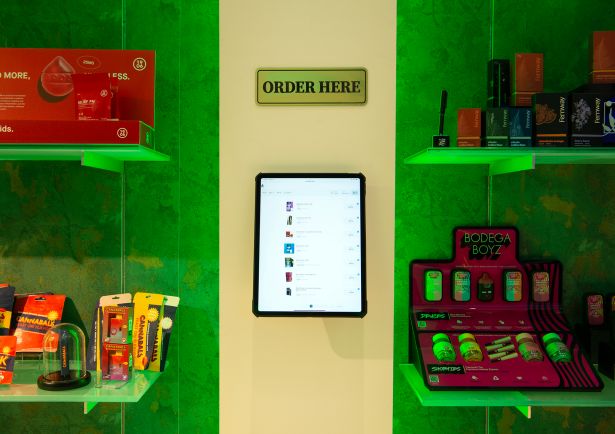With New York Cannabis Stores, Does Calling It ‘Luxury’ Help in Leasing?
The short answer’s a maybe
By Mark Hallum May 21, 2025 6:00 am
reprints
We’ve heard of high-end retail, but this is ridiculous.
A number of New York City cannabis dispensaries have set up shop in wealthier retail corridors and have dressed the part accordingly, branding their stores as luxury with more comfortably fashionable interiors, and carrying premium products for well-heeled patrons.
In fact, dispensaries everywhere seem to be making every effort to rise above the low-water mark established by the everyday corner store selling flower on doobie-ous legal standing.
But does elevating a cannabis shop — with high-end products and services as well as an equally luxurious atmosphere — really alleviate New York’s often hellish opening process for all parties involved?
Arish Halani, CEO of Herbwell Cannabis, recently opened a store at 519 Madison Avenue. The East Midtown location is only a couple of blocks from Saks Fifth Avenue along a stretch that includes boutique clothing and shoe stores, never mind law and finance offices as well as the apse of St. Patrick’s Cathedral. Halani said he has found that the biggest challenge facing cannabis purveyors is convincing landlords to open their hearts to the industry even if the financing on the building does allow for payments to be made with money raised from cannabis sales.
“Even if their bank says yes — which is rare — the general concept of ‘Well, we don’t want a smoke shop [prevails],’” Halani told Commercial Observer. “They don’t understand that this is a highly corporate environment with a litany of regulatory requirements to make sure the business is operating nowhere near what a smoke shop would look like.”

Dispensaries have to overcome many hurdles to lease and operate a legal storefront. The luxury aspect buys proprietors the leverage they need to convince all the other stakeholders that they plan to operate a strong business that can pay its rent and maybe even sign a lease renewal.
Halani said the Madison Avenue location — much like with his store at 372 East Fordham Road in the Bronx — started off with a “no” from the landlord. The would-be tenant had to then “play the game of convincing.”
“If I could find an address that was seemingly eligible or [the broker] found an address that was seemingly eligible, it got put in a pot, went through all the due diligence, and then we can start the journey of putting in a letter of intent that got rejected nine out of 10 times,” Halani said.
Herbwell is in a league of its own alongside posh cannabis shops Travel Agency at 587 Fifth Avenue, The Flowery at 481 Broadway, Dagmar at 412 West Broadway or Bliss+Lex at 128 East 86th Street. All have sprouted up over the last year.
Landlords eventually relent to a cannabis tenant completely on their own favorable terms, according to Ben Davis, a director at brokerage Ripco Real Estate. Often that means landlords will take a premium on rents, collect a piece of the revenue from the business, or get paid for the space while the permitting process is still moving along and no shop has actually opened.
When it comes down to luxury cannabis tenants, there isn’t much of a difference in the process or the availability of space, Davis said.
“I think that, ultimately, [cannabis retailers] are still trying to find their place, and it’s an infant industry. … Some shoppers may not appreciate seeing a luxury dispensary on their block,” Davis said. “Overall, I think that whether it’s luxury-focused or a neighborhood-focused dispensary … most of your challenges are pretty much the same. The hardest part is finding a location because of how tight the market is these days.”

Long-standing obstacles include the sluggish nature of bureaucracy at the New York State Office of Cannabis Management (OCM), landlords who won’t do legal weed deals based on personal objections or financial reasons, and opponents in the surrounding communities.
The community engagement aspect seems to be the least chaotic part of establishing a licensed dispensary in New York City, where the search for available space has been characterized as a painful process of interacting with landlords individually until finally a welcoming environment is found.
The trick for aspiring retailers is less about getting a license from the OCM than it is locking down a storefront once that license is granted. Currently, the OCM is issuing licenses at a rate best described by Platform Cannabis Advisors (PCA) CEO Ben Sheridan as a “trickle.”
Sheridan’s firm offers a solution to the tightrope of securing both a license and storefront in a timely manner.
“We help our clients who hold cannabis licenses secure compliant retail locations, and then give them the wraparound services and resources to get their doors open for effectively zero capital down,” Sheridan told CO. “That’s what we’ve done on five stores that are now open as of this week.”
Essentially, PCA finds and secures locations for their clients and subleases the space to the licensee, even offering interest-free loans for the buildout of the store and eventually taking 10 percent of the company’s gross revenue as a cost of doing business.
Finding a good property involves answering a number of questions.
“Is there a mortgage on the property? Is that mortgage held by a bank that’s going to say no to this, or someone else who’s going to say no to this?” Sheridan said. “That’s almost right off the cuff — you’re going to lose many properties that might be available right there. And then there’s the stigma, which is certain landlords simply don’t want to be involved with it. So, once you’re past those two factors, the landlords who want it are probably going to charge the green tax, which is, ‘Hey, I smell blood in the water. I smell desperation. Let me try and jack up the price here.’ Usually it doesn’t work out for anybody.”
Basically, the landlord holds all the cards, which often means asking for guarantees from tenants who could be paying $20,000 to $30,000 a month in rent, sometimes without having any sort of track record in retail. With PCA, landlords are vetted and clients get to hold onto all the equity in the business.
“Landlords love track records, [but] they love knowing that there’s people who are guiding these business owners who might be new to this,” Sheridan said. “Landlords aren’t blind to the business opportunity.”
Sheridan founded the firm with Matthew Greenberg after working at the OCM as deputy director of strategy and policy implementation. Greenberg handled economic policy at the OCM, and later was a co-CIO of East Hill Capital, a cannabis investment firm.
Some brokers aren’t even interested in devoting the time it takes to make a cannabis deal work, considering that the lease signing, community board approval and the issuance of the permit have to be timed close together in order to be practical. Meanwhile, most landlords who have a loan on their property from a federally insured bank usually won’t — or can’t — rent to cannabis purveyors at all.
“One of my agents here did a lease for a cannabis space, and I will tell you this lease was signed, I want to say almost nine months ago — they still haven’t opened,” Adelaide Posinelli of Compass said in an interview. “So, for a broker, it’s 10 times more work, there’s no guarantee or surety of it happening. … At the end of it, someone could change their mind, and you’re done.”
Whether a broker does take on a cannabis client also has a lot to do with the money they make from the tenant, or it often boils down to whether they have a relationship with them, according to Davis.
When brokers and landlords do actually work out a lease arrangement, it is usually because the tenant is paying a much higher asking rent. One tenant was paying as much as $350 per square foot in a building where asking rent was $150 per square foot, according to Polsinelli.
“They overpay for space, which then begs the question: How long can they sustain that?” Polsinelli said.
Polsinelli is skeptical that branding a shop as luxury and setting it alongside the likes of Gucci and Hermés would actually make a difference to any other players involved, especially with doubts that the kind of high-profile clientele hitting those corridors would want to be seen in a dispensary.
But, whatever works, she said.
“While some shops feel like you’ve wandered into a college dorm with better lighting, these high-end dispensaries in a Madison Avenue boutique, with budtenders instead of bartenders, should appeal to the locals in the area,” Polsinelli added. “Add a collab with Gwyneth Paltrow and a $300 infused candle, and who knows how high this trend will go? But, hey, if you can sell $90 eighths next to Dior and still pay top rents, I doubt too many people will complain.”
It’s unclear if having a luxury dispensary as a tenant is a red flag for future tenants, according to sources CO consulted.
One place where a dispensary has had little luck on a high-end corridor has been the West Village’s West Eighth Street. Polsinelli said the same proprietors have tried multiple times at different properties on West Eighth and been rejected by Manhattan Community Board 2 for various reasons.
More traditional retail brokerages are equally game to keep leaping hurdles until they get a deal signed. Brandon Singer’s Retail by MONA secured deals for dispensaries such as FlynnStoned Cannabis Company, which signed a 2,600-square-foot lease at 388 West Street in the West Village in March in a space along the West Side Highway that sat vacant for 20 years.
Singer believes that the luxury dispensary is just a branded opportunity for the retailer to fit into whatever neighborhood it chooses to serve, and he was skeptical that would earn cannabis retailers any appeal from the surrounding community.
“I wouldn’t call [dispensaries] a ‘luxury’ tenancy per se, but I do think that the buildouts and look and feel of some of these stores are super comfortable and upscale-looking,” Singer said. “Not sure if they’d necessarily fit on a luxury corridor a la Madison Avenue, but I do think the experience is upscale and high end.”
Surprisingly, regardless of how long a space sat idle, landlords are charging up to 50 percent above market rate for dispensary tenants. (But every space is different. The one leased by FlynnStoned, for example, came with an asking rent of $200 per square foot. The average retail rent across major Manhattan retail corridors was $697 per square foot in the fourth quarter of 2024, according to a report from CBRE.)
Landlords also recognize the benefit of state regulations prohibiting competitors from setting up shop within 1,000 feet of a school or 500 feet of a religious institution. Because of those distance restrictions, the city’s cannabis sector can only grow so big.
New York’s legal cannabis sales rollout in late 2022 was a bit like the Wild West in its infancy, with any old corner smokeshop selling grass with THC — often without approval from OCM, and often just eating the cost of fines if the authorities became privy to their dealings. Illegal weed sales became a simple civil violation.
The rapid growth of unlicensed marijuana sellers in New York has also been partly attributed to how slow the OCM was to issue licenses.
No matter what the excuse, the state eventually had enough. Gov. Kathy Hochul announced in April 2024 that the OCM would have the authority to padlock storefronts in violation.
Landlords wouldn’t be getting away scot-free either.
If they were warned about a tenant acting as an unlicensed dispensary, yet failed to begin eviction proceedings, property owners would be made liable for a fine of up to $50,000.
With the New York Police Department playing a major role in shutting down bad actors, Retail by Mona’s Singer said the runway is clear for law-abiding proprietors to make a better name for their trade.
“I think what we’ve seen is the original guys that kind of had all their issues got shut down or out of the way,” Singer said. “A lot of these operators have very, very well-designed, beautiful, comfortable buildouts that look really good. They’re obviously selling a product that is controversial, and in our lifetimes was illegal. But I think a lot of the operators that have licenses now are doing a great job conveying the product in a luxurious type of way.”
Since the crackdown, the state has seemed slow and deliberate in its issuance of new permits. Military veteran William Norgard, who challenged the state in court for favoring those with criminal records in licensing decisions, was awarded a license in July 2024. He signed a 10,040-square-foot lease across four floors at Boich Investment Group’s 30 Times Square.
A first, let alone a last, dance with Mary Jane will forever be out of the question for the most stubborn landlords who Singer said comprise that majority.
“Some landlords, you’ll never change their mind,” Singer said.
Why would the landlords without obligations be opposed to a profitable venture?
Well, leasing to cannabis tenants has come back to bite some property owners in unexpected ways in the past.
In 2022, Joseph Sitt’s Thor Equities was embroiled in a lawsuit with California-based dispensary chain MedMen after the latter failed to pay almost $1 million in back rent for a Chicago storefront in Fulton Market.
The two parties went to court in the Southern District of New York, which eventually led to MedMen’s attorney arguing that the federal government cannot enforce any rent obligations on a venture involving weed, which is still illegal on a national level.
With the federal judge questioning whether the lawsuit even belonged in the Southern District’s jurisdiction, Thor dismissed its own case and planned to file the lawsuit in California.
Culver City, Calif.-based MedMen attempted to block that action, and it seems Thor was out $1 million. (Thor did not respond to a request for comment.)
Either way, MedMen as a business was not long for this world, and by April 2024 all its locations had shuttered.
Mark Hallum can be reached at mhallum@commercialobserver.com.



